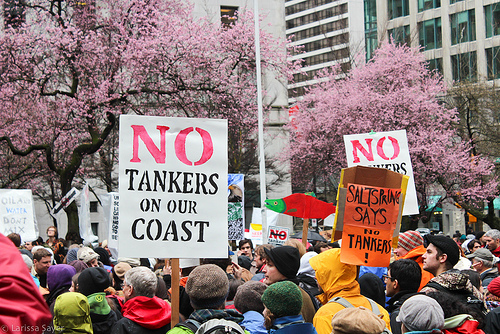The RCMP has been spying on a group of British Columbia First Nations whose vocal opposition to Enbridge’s Northern Gateway pipeline has taken them to the company’s annual shareholders meeting in Toronto, according to documents obtained through an access-to-information request.
The documents show that a provincial RCMP unit has been closely tracking the potential for “acts of protest and civil disobedience” by the Yinka Dene Alliance, a coalition of northern B.C. First Nations who have been at the centre of resistance to Enbridge’s $5.5 billion pipeline proposal.
Their territory covers a quarter of the route of the pipeline, which would carry more than 500,000 barrels of oilsands crude from Alberta through pristine territory to Kitimat, B.C., for export by supertanker to Asia and other markets.
The revelations add ammunition to critics who have charged that the Harper government is waging a campaign to demonize legitimate opponents of resource developments like the Northern Gateway, by labelling them as radicals or including them in Canada’s “counter-terrorism” strategy.
Saik’uz First Nation Chief Jackie Thomas, a member of the Yinka Dene Alliance who made a cross-country trip on the “Freedom Train” to protest in Toronto against the pipeline on Wednesday, said she has had suspicions for some time about RCMP surveillance.
“We’ve always been peaceful, but this is how they try to paint us as the enemy,” said Thomas, a grandmother and mother of four concerned that an oil spill could destroy the lands she hunts and fishes on with many of her community members.
“The federal government seems to be using all its arms to push through this project against the will of anyone who opposes it, but we won’t be deterred. It is not a crime to defend our land and waters from a tarsands pipeline and to make the future safe for our grandkids.”
According to the documents, the RCMP unit gathered intelligence from unspecified “industry reports,” newspapers and websites, and Facebook and Flickr photo accounts.
They also appear to have monitored private meetings, including one between First Nations and environmental organizations held in Fraser Lake, B.C., at the end of November, which Thomas says was not announced publicly.
The meeting’s purpose was “to strengthen the alliance between First Nations and environmental groups opposing Enbridge,” an intelligence report from December states.
Enbridge declined to comment about whether it has been exchanging information with the RCMP.
The monthly intelligence reports note that the oil company “will experience increasingly intense protest activity due to the environmental sensitivity of the Northern Gateway path, combined with the fact that the territory has never been ceded to the Crown by First Nations in B.C.”
The pipeline would cross more than 700 rivers and streams, whose abundance of fish has spawned an economy integral to the region, and three vital watersheds: the Mackenzie, the Fraser and the Skeena.
More than 100 First Nations have banned an Enbridge pipeline from their territories, declaring “we will not allow our fish, animals, plants, people and ways of life to be placed at risk.”
An intelligence report notes that the Yinka Dene Alliance will show an “increasing propensity and likelihood of utilizing blockades and confrontation to deter industry from accessing disputed territory.”
With opposition growing among the B.C. population, including NDP leader Adrian Dix, likely the next premier, Enbridge will face an uphill battle to build the pipeline.
As previously reported in the Toronto Star, a national RCMP surveillance program monitoring First Nations that ran between 2007 and 2010 shared similar intelligence reports about First Nations with the private sector, including energy companies.
According to newly released documents, since the closure of that national program the surveillance has continued under different RCMP branches.
A RCMP spokesperson said intelligent reports are provided only to law-enforcement agencies.
The provincial unit has been tracking protests by other B.C. First Nations, including opposition to the Pacific Trails pipeline that would bring liquefied natural gas to the coast for export, and the expansion of the Kinder Morgan pipeline carrying Alberta crude oil to tankers in Vancouver.
The RCMP also kept tabs on conflicts over logging, mining, and fracking, and monitored ongoing and potential court cases involving First Nations.
This article was originally published in the Toronto Star and is reprinted here with permission.
Tim Groves is a freelance journalist and investigative researcher based in Toronto. Martin Lukacs is a writer and organizer in Montreal.




